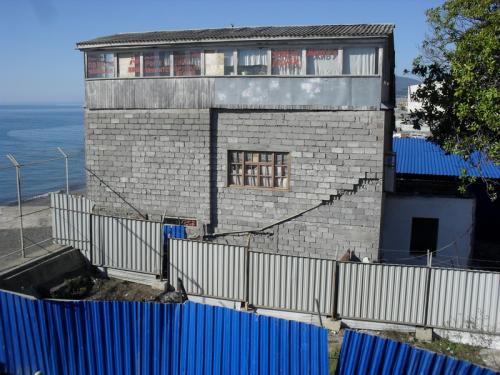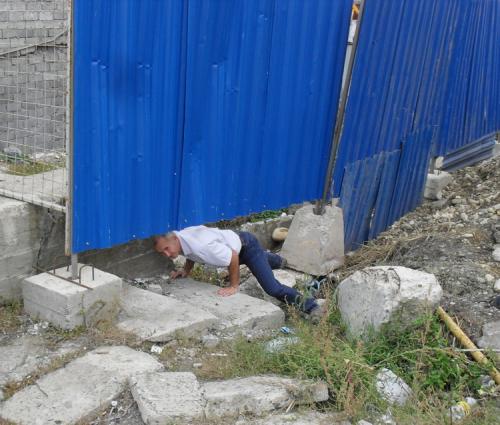Russia: Halt Forced Eviction for Olympics Road
Olympics Organizers Yet Again Deny Compensation
The Russian authorities should stop the impending forced eviction of a Sochi family to make way for road construction ahead of the 2014 Winter Olympic Games, Human Rights Watch said. The International Olympic Committee (IOC) should urgently review the case and insist that the Russian authorities provide the family with fair compensation.
Alexei Kravets in front of his home on the Black Sea coast in Sochi. The house is slated for demolition to make way for a key road for the 2014 Winter Olympics.
As a result of the often chaotic transition from the Soviet communal land era, many homeowners in Sochi do not have clear title to their property. For years, however, the authorities have treated the homes and individuals’ use of them as legal. With this and other cases as examples, the IOC should investigate whether local authorities are suing homeowners for constructing homes unlawfully to avoid the regular processes for compensating property owners evicted for construction of Olympic venues and infrastructure.

Alexei Kravets’ home on the Black Sea coast in Sochi is slated for demolition to make way for a key road for the 2014 Winter Olympics.
Aleksei Kravets, 39, has been living in a three-story home he built himself in Sochi on the shore of the Black Sea for nine years, together with his thirteen-year-old son. The Sochi authorities claim that Kravets has no right to compensation for the house and are threatening to evict the family and demolish the home in the coming days. Guards on the road construction site have threatened Kravets with beatings and destruction of his property.
“This family has the right to compensation, and shouldn’t be evicted until it’s been provided,” said Jane Buchanan, senior researcher on Europe and Central Asia for Human Rights Watch. “Olympic construction is again being used as an excuse to evict a family and deprive them of their rightful home and compensation.”
On October 9, 2012, a subcontractor of Russian Railways, which is building the road, erected a 2.5-meter metal fence around the house. On October 15, a second fence was erected, this time with barbed wire along the top. Family members must crawl through a hole at the bottom of the fence or climb over the fence in order to leave the property to attend school or buy food or water.

Alexey Kravets leaves his house by crawling under a construction fence surrounding his home, which is slated for demolition to make way for a key road for the 2014 Winter Olympics.
Guards at the site, armed with mace, stun guns, and rubber truncheons, have threatened Kravets, saying they will “bash him up” and start destroying the house. Kravets has filed two complaints with the local police regarding the threats and the fence, but has received no response. He told Human Rights Watch that he believes the fences and the threats are designed to intimidate him and force him to leave the property.
“The authorities have created an unbearable situation for the Kravets family, apparently to compel them to leave their home,” said Buchanan. “Kravets and his son should not be forced to endure this harassment and indignity.”
Local authorities claim that the Kravets’ home was built illegally and sued the family in May and October 2012, ultimately winning a court order to demolish the building. Aleksei Kravetstold Human Rights Watch he did not receive notification of the October legal proceedings. The court decision is subject to “immediate execution.”
By failing to properly inform Kravets of the hearing and ordering swift execution of the court order, the court is failing to ensure Kravets’ right to due process, including to appeal a decision affecting him, Human Rights Watch said.
In suing Kravets for constructing their house unlawfully, the local authorities are able to avoid the regular processes for compensating property owners evicted for Olympic construction.
An independent appraisal in 2011 valued Aleksei Kravets’ 152 square-meter, three-story house located on the shore of the Black Sea at 13 million rubles (US$422,000).
Prior to and during construction of the home, Aleksei Kravets filed multiple notifications with the authorities regarding the construction largely based on improvements to legal structures built on land leased to his father under an indefinite lease. The authorities twice issued the home a technical passport, in 2003 and 2010. He also twice tried, unsuccessfully, to privatize the property.
Prior to the establishment of the Olympic program, the authorities never insisted that the building was illegal or forced him to leave.
“Despite ample opportunities, the Sochi authorities at no point suggested that Kravets should stop his efforts and considerable investment to improve the lawful buildings on the plot, which ultimately resulted in the house he lives in today,” Buchanan said. “Now, with Olympic construction underway, the authorities suddenly decide to take advantage of an ambiguous legal situation and deprive the family of their rightful compensation. We’ve seen this same tactic in other recent forced evictions for Olympic construction in Sochi.”
The treatment of the Kravets family by the authorities and the courts violates Russia’s obligations under international human rights law, Human Rights Watch said. Under the International Covenant on Civil and Political Rights and the European Convention on Human Rights, the Russian government is obliged to respect and protect the rights of all people from arbitrary interference in their home and family life. The failure to respect and protect those rights and ensure a fair process concerning the Kravets home is a violation of the European Convention.
Forced eviction – or the coerced or involuntary displacement of individuals from homes or lands that they occupy or depend on – without provision of and access to appropriate forms of legal or other protection as well as provision of reasonable compensation, is a serious violation of international law.
“Unfortunately, the Kravets’ family is not the only one to experience this type of eviction without compensation,” Buchanan said. “The International Olympic Committee has a crucial role in preventing any further situations like this. It should no longer simply sit by and watch as the local authorities trample the Olympic ideal of dignity by forcing people out of their homes without compensation and in an environment of threats and harassment.”
Source: Human Rights Watch
- 358 reads
Human Rights
Ringing FOWPAL’s Peace Bell for the World:Nobel Peace Prize Laureates’ Visions and Actions

Protecting the World’s Cultural Diversity for a Sustainable Future

The Peace Bell Resonates at the 27th Eurasian Economic Summit

Declaration of World Day of the Power of Hope Endorsed by People in 158 Nations

Puppet Show I International Friendship Day 2020

